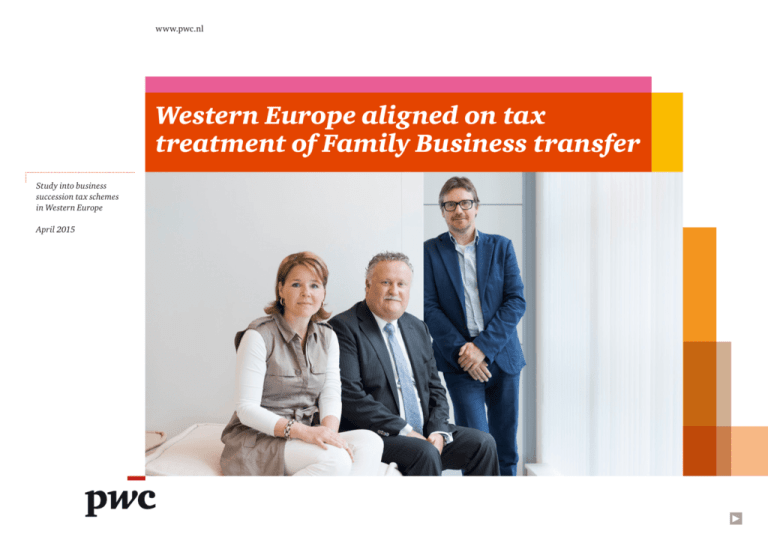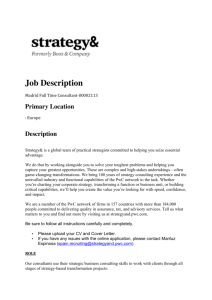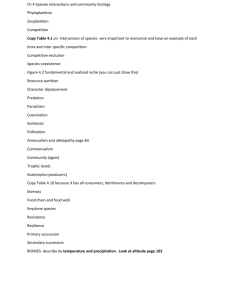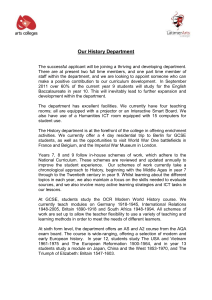
www.pwc.nl
Western Europe aligned on tax
treatment of Family Business transfer
Study into business
succession tax schemes
in Western Europe
April 2015
Contents
Foreword
Foreword2
In this publication “Western Europe aligned on tax treatment of Family Business transfer – Study into business
succession tax schemes in Western Europe”, we present the results of our research. We examined the schemes
of Belgium, Germany, Finland, France, the Netherlands, Spain, Sweden, Switzerland and the United Kingdom
one by one, paying particular attention to the treatment for gift and inheritance taxes. For practically all these
countries, family businesses form the driving force of their economies.
Family businesses from a West-European perspective3
Business succession schemes for gift
and inheritance tax
4
Background to the business succession schemes
6
Conditions7
Other tax schemes and special situations
8
Political debate on business succession schemes
9
Conclusion and recommendation
10
Clarification11
Contact12
The results from the Global Family Business Survey 2014, a study we conducted among
2,378 family businesses in over 40 countries, show that these businesses still constitute a dynamic
and resilient sector in many countries. Apart from financing the company and retaining high-quality
employees, business succession is one of the most important challenges facing a family business.
The business succession tax schemes appear to be under pressure in several countries, something
that is confirmed by our West-European Family Business Specialists. This impression also emerges
from the recent study PwC the Netherlands conducted into the necessity of business succession schemes for the continuity of
family businesses in the Netherlands1. This study reveals that the continuity of many family businesses will come under threat
if the schemes are indeed cut back. Making the schemes less generous would increase the financing needs of many family
businesses, where obtaining finance is already a major challenge for them.
Most of the West-European countries concerned have specific tax facilities for business succession that include substantial
allowances. Something that stands out is the similarity of approaches towards the family business in West-European countries.
The main justification for the schemes is that the continuity of family businesses must be safe-guarded. The effective tax rates in
the subject countries – with a range of zero percent to 4.5 percent and an average of 2.8 percent – line up nicely with each other.
Our conclusion is that not only the backgrounds to the West-European tax facilities, but also the exemptions and related
conditions all harmonise well. As such, Western Europe presents a level playing field. We urge that nothing be done to disturb
the balance. The future of the family business lies very close to our heart. We therefore stress the need to retain and anchor
these facilities, so that – and this is especially important in these uncertain economic times – family businesses will be able to
focus on the continuity and growth of their activities, without the distraction of unnecessary tax issues. A situation of direct
benefit to society in Western Europe.
Renate de Lange
Tax Partner
Hartwig Welbers
Tax Partner
1 Direct line inheriting
PwC | Western Europe aligned on tax treatment of Family Business transfer
2
Family businesses from a West-European perspective
Without question, the family business segment makes an exceptionally important
contribution to the economies of Western Europe. In virtually every European
country, the vast majority of companies are family businesses. Moreover, for most
of these countries, the segment accounts for at least 50 percent of the gross domestic
product, as the table below shows. Although family businesses are on average
somewhat smaller than other companies, they generate almost half of all jobs.
On a global scale, it is estimated that 80 percent of business activities are conducted
by family businesses.
Figure 2 List of subject countries
Legenda
Effectieve
belastingdruk
zonder faciliteiten
(%)
Effectieve
belastingdruk met
faciliteiten (%)
Strangely enough though, the segment receives relatively little attention from policymakers and
researchers. There is not yet any systematic recording of data about the segment, as evidenced by
the empty cells in the table. Research that is conducted shows that family businesses beat their
counterparts as regards several indicators, including return on capital and long-term continuity.
Family businesses can take credit for creating the lion’s share of new jobs. On average, they are
more innovative and more open to change.2
% Familiebedrijven
0 - 60
60 - 80
Legend
> 80
0 - 60
Figure 1 EU - family business metrics by country
Family
Family
Family
Contribution
businesses
business
business
of family
as % of all
employment employment businesses
companies
as % of total as % of private to GDP
sector total
Belgium
77%
45%
n.a.
33%
Germany
79%
44%
n.a.
55%
Finland
80%
24%
42%
40% - 45%
France
83%
49%
n.a.
60%
Netherlands
69%
49%
n.a.
53%
Spain
85%
42%
70%
70%
Sweden*
54%
35%
n.a.
30%
Switzerland
88%
n.a.
n.a.
n.a.
United
Kingdom
65%
n.a.
40%
24%
Number
of family
businesses
60 - 80
Number
of family
business
employees
123,000
n.a.
250,000
n.a.
260,050
2,900,000
n.a.
n.a.
1,710,000
16,929,733
600,000
12,686,222
4,211,264
13,900,000
1,594,260
n.a.
2,959,346
9,200,000
> 80
Family businesses as
% of all companies
2
* Does not include companies with less than 5 FTEs and revenue less than 526 kronor, so that the number of family
businesses is understated.
Sources: ecobelang familiebedrijven_nl, Instituto de la Empresa Familiar, Witboek_Familiebedrijven, met een familie­
bedrijf de crisis door, http://knoema.com/OECD95dec/oecd-economie-no-95-december-2014
2 Global Family Business Survey (PwC, 2014).
PwC | Western Europe aligned on tax treatment of Family Business transfer
3
Business succession schemes for gift and inheritance tax
Our Dutch study shows that the business succession scheme is a key factor for the
continuity of family businesses.³ This motivated us to study the business succession
schemes in nine West-European countries, including the reasons for implementing
them. Below we provide an outline of the schemes in terms of gift and inheritance tax
for these countries.
Figure 3 Facilities in the scheme
Main rules
20%
4%
0% 0%
Effectieve
Apart from Sweden, which
abolished gift and inheritance taxes ten years ago, all the subject
belastingdruk
zonder faciliteiten
countries tax a gift or inheritance
of a family business. The standard rates vary by country,
(%)
from zero percent to 45 percent. They apply for the transfer to children and/or domestic partner.
Effectieve
If an acquiring party does
not fall into this category, most countries will levy a higher rate. For
belastingdruk met
the acquisition by a childfaciliteiten
or domestic
(%)partner, the average minimum tax rate in all countries
concerned is about five percent, and the average maximum rate about 30 percent.
Specific schemes
40%
20%
27%
0%
45%
0% 0%
Legenda
Legend
3.4%
30%
3%
20%
4%
4.5%
3.5% 3.5%
43.8%
Legenda
Effective
tax rate
Effectieve
belastingdruk
without
facilities (%)
zonder faciliteiten
(%)
Effective
tax rate
Effectieve
belastingdruk
with
facilities (%)met
faciliteiten (%)
3.44%
No gift tax or
inheritance tax
Tax base reduction
0.44%
Tax rate reduction
In seven of the nine countries, the standard tax system gives special treatment to the transfer of
a family business. A special scheme is unnecessary in Sweden because gift and inheritance taxes
were abolished there. Although Switzerland currently has no national scheme, most cantons grant
full or partial exemption for the domestic partner, children and grandchildren, as well a reduction
for other family members, such as parents and stepchildren.
In six of the seven countries with a business succession scheme, it takes the form of an exemption
for the transfer. The exempt percentage varies from 60 percent to 100 percent, the average being
80 percent.
Finland has the lowest percentage (60 percent), but levies the tax on the carrying value of the
family business for financial reporting purposes. This contrasts with the other countries, which
use the market value. Under normal circumstances, the market value exceeds the carrying value.
Accordingly, the effective tax rate in Finland is not substantially higher on average than in the
other countries.
No facilities
30%
3,5%
3 “Business succession schemes are essential – Study into the effect of business succession schemes on the continuity
of family businesses” (PwC, December 2014).
2
4,5%
PwC | Western Europe aligned on tax treatment of Family Business transfer
4
In Germany, the Netherlands, Spain and the United Kingdom, the exemption is virtually 100 percent. The United
Kingdom grants an exemption of 100 percent across the board. The exemption in the Netherlands is 100 percent
for family businesses valued at approximately one million euros or less. For any amount in excess, an exemption
of 83 percent applies. The standard exemption in Spain is 95 percent, increasing to as much as 99 percent in a few
regions (Madrid being one of them). In Germany, too, there are different exemptions.
There, the general exemption for a family business is 85 percent of its market value. However, if no more than ten
percent of the capital in the family business represents investments (including surplus liquid assets), the exemption
can be as high 100 percent.
Belgium’s scheme is different, the facility being a reduced tax rate rather than an exemption. The standard rate for
an inheritance is 27 percent (if the value is 250,000 euros or more), and for a gift, three percent. Where a family
business is transferred, these rates drop to three percent and zero percent respectively.
Figure 4 Exemption percentages
Country
Germany
85%
100%
60%
60%
France
75%
75%
Netherlands
83%
100%
Spain
95%
99%
United Kingdom
50%
100%
* Exemption is based on the carrying value for financial reporting purposes.
Figure 5 Effective tax rate without facilities (%)
50%
As the above makes clear, the specific business succession schemes of the subject countries do not differ much,
with most based on exemptions. The effective rates, too, show relatively little variation, ranging from zero percent
to 4.5 percent.
40%
30%
Payment schemes
All countries that levy gift and inheritance tax on the transfer of a family business have a scheme for payment
deferral. The schemes show many variations. Some countries allow full deferral, with the entire sum falling due
only after expiry of the deferment period. The Netherlands, for example, uses a deferment period of ten years.
Another variant is to spread the payment of the tax owed. In the case of France, the period is fifteen years. There
are also mixed schemes, combinations of full deferral and spread payments. One example is Spain. It allows a fiveyear deferment period, followed by payment in ten instalments over the next five years. A further variation is that
some countries charge interest on the deferred amount, while others do not.
45
43.8
40
30
27
20
20
20%
10%
0%
For the countries that impose a gift tax and an inheritance tax, the average effective rate is about 2.8 percent. We
base this assertion on the maximum effective tax rate for each country. In almost all countries, the levy is well
below five percent.
Maximum exemption
Finland*
Effective tax rate
Belgium, the United Kingdom, Switzerland and, subject to certain conditions, Germany levy no tax on the gifting of
a company. The same applies in the United Kingdom, Switzerland and, subject to the same conditions, Germany in
the case of an inheritance.
Minimum exemption
0
Belgium
Finland
France
Germany Netherlands
Spain
3.5
Sweden Switzerland
UK
Figure 6 Effective tax rate with facilities (%)
50%
40%
30%
20%
10%
0%
3
4
Belgium
Finland
5
3.44 4.
France
3.4
Germany Netherlands
0.44
Spain
0
3.5
Sweden Switzerland
0
UK
Finally, there are differences in the degree of eligibility as regards the payment scheme. In Finland, France, the
Netherlands and Spain, it is sufficient to simply request use of the facility. Belgium and Germany by contrast apply
a test to see whether there is a threat to the continuity of the business or even an especially dire situation.
PwC | Western Europe aligned on tax treatment of Family Business transfer
5
Background to the business succession schemes
The fundamental reason for various countries having such schemes is essentially
to ensure continuity of family businesses. Encouraging and protecting family
businesses, including the employment they provide, are also arguments often put
forward4.
To a lesser degree, the schemes serve to protect the heirs and hence to counter misuse. Without
such a scheme, the heirs would face a substantial tax assessment on inheriting the family
business. They might then feel compelled to sell the family business – quickly and under less
favourable conditions – to a third party at a price below market value.
Given this backdrop and justification for the business succession schemes, the importance of
such schemes for the family business has been clearly recognised in the legislative process. Not
a great surprise, considering that family businesses constitute the majority of all enterprises
in the national economies. It is an extremely important sector from an economic perspective.
Accordingly, protecting it by means of a business succession scheme actually protects the
economy on a broader front.
A particular consideration is reflected by the nature of the exemptions in Belgium. This country
has deliberately chosen to encourage the succession of a family business while the owner is
alive, by imposing a lower tax rate than after the owner has died. Hence, the transfer need
not wait until the owner’s death. The motivating idea is that, while the owner is still alive, the
family will make a well-considered decision, which is even more beneficial for the continuity of
the business.
4 These considerations are evident in the explanations of the various national legislative procedures, and are clarified by
our PwC family business specialists in the countries concerned.
PwC | Western Europe aligned on tax treatment of Family Business transfer
6
Conditions
To ensure that a business succession scheme can be applied correctly, a variety of
conditions are now in place. In most jurisdictions with a scheme, these conditions
fall into one of the categories of testator/donor, successor and company.
Figure 7 Conditions
Country
Belgium
Germany
Finland
France
Netherlands
Spain
UK
*
**
***
****
Minimum
interest (%)
Continuity
requirement
(years)
50*
Active
company
Ownership
requirement
(years)
3
-
ü
25 / -
5
-
ü
10
5
-
ü
4
2
ü
20 or 34**
5
5 or 20****
-
5
1 or 5***
ü
10
-
ü
-
2 (or 2 out of 5)
ü
Together with family.
Non-listed and listed, respectively.
Inheritances and gifts, respectively.
Direct and together with family, respectively.
Successor
In many cases, the successor shareholders – heirs or donees – have to ensure that a continuity
requirement is satisfied. This does not mean that the successor has to be an active entrepreneur.
Meeting the requirement in order to obtain the full benefit of the scheme calls for the successor to
hold the shares for a specified period. For a specified period, the successor shares in the financial
ups and downs, without actually working for the company. In the subject countries, the length of time
that the successor must hold the shares varies from three to ten years. Belgium imposes an additional
requirement applying to voting rights in the company.
Testator/donor
For virtually all the countries concerned, a minimum interest has to be transferred or exist for the
business succession scheme to be applied. The range of minimum percentages is quite wide.
Whereas the Netherlands specifies a minimum interest of five percent Belgium stipulates at least
50 percent together with family members, with a number of alternatives for a lower percentage
(together with family members or otherwise) to apply, subject to certain conditions.
A few countries specify additional requirements relating to the testator/donor. Application of the
gift tax scheme in Spain is subject to an age threshold of 65 or (partial) disability. The Netherlands
imposes an additional requirement for length of ownership: one year preceding an inheritance and
five years preceding a gift. The United Kingdom imposes a similar condition of two years in principle.
In France, the scheme applies only in the case of a joint shareholding. This is subject to a minimum
of twenty percent or 34 percent, depending on the type of shares. There is an additional requirement
in that the shareholder agreement must include a provision forbidding the transfer of the shares within
two years.
Company
All the subject countries that have a succession scheme require the business to be an “active
company”. Their various regulations define this term, with the activities broken down by specific
industries in some cases. The company must often continue to operate unchanged for a certain
period following the gifting or the inheriting.
PwC | Western Europe aligned on tax treatment of Family Business transfer
7
Other tax schemes and special situations
Five of the subject countries (Belgium, Finland, the Netherlands, Spain and
the United Kingdom5) also grant a capital gain exemption on the transfer of a
family business. In this context, the gifting or inheriting of the family business is
treated like an ordinary transfer on which a capital gain is realised. The countries
concerned tax this – notional – capital gain, in some cases by levying income tax,
and in others by levying wealth tax.
Germany and Sweden only tax actual realised capital gains. In Switzerland, no part of a gift
or inheritance is subject to wealth tax or income tax, irrespective of whether a sum of money,
company or other type of asset is transferred.
Only France fully taxes the capital gain on the transfer of a family business.
Two countries set almost the same conditions for exemption from gift and inheritance tax,
and from capital gain tax. The Netherlands aligns the conditions for exemption from income
tax (on the capital gain) with those relating to gift and inheritance tax. However, for a gift to
qualify for exemption from income tax, an additional condition applies in that the successor
has to have been in the employment of the family business for three years prior to the transfer.
In Spain, the conditions for exemption from inheritance tax are the same as those for capital
gain tax, with one exception. This extra condition is that the successor to the business has to
hold the inherited shares for at least ten years.
What is striking about tax on family businesses in general is that Spain grants the company
full exemption from capital gain tax, not only on a transfer but also during ownership. When
a family business is inherited, the heirs have the option of valuating the acquired shares
at the market value of the assets. As a result, the growth in value until the time of death is
permanently exempt from capital gain tax on a subsequent sale, including a sale outside
the family.
Figure 8 Levy on capital gains
Legenda
Legend
Effecti
belasti
zonder
(%)
Exempt
Effectie
belasti
facilite
Partially
exempt
% Familie
No scheme
0 - 60
60 - 80
No tax
> 80
Continuing this theme, something unusual concerning Sweden is that it taxes the sale of a family
business to another family member more heavily than a sale to a third party. This is because the
sale to a third party can qualify for special treatment, being that, subject to certain conditions,
the gain on the sale is deemed private income ultimately taxed at a reduced rate of 25 percent.
This treatment is not available for a transfer to the children. In such cases, the standard rate of 58
percent applies. Sweden is currently analysing whether this scheme needs amending because of
discrimination between a sale to a family member and a sale to someone outside the family circle.
5 In the United Kingdom, only transfers in the form of a gift are subject to capital gain tax.
PwC | Western Europe aligned on tax treatment of Family Business transfer
8
Political debate on business succession schemes
Apart from Belgium and
the United Kingdom, a
heated political debate
is raging in the countries
concerned about the
continued existence of
their respective business
succession schemes.
Spain
Misuse of the scheme in recent years was one motivation for debate
in Spain. Specifically, mixing active business assets with pure passive
investment assets has led to calls for the scheme to be scrapped. However,
an investigation commissioned by the Spanish government concluded that
the exemption should be reduced from 95 percent to between 70 percent
and 50 percent instead of abolishment.
Germany
The Federal Constitutional Court6
recently ruled that Germany’s business
succession scheme was partly in conflict
with the Constitution. In the opinion of
the Court, the present scheme is far too
favourable towards large companies.
Germany’s legislative body must amend
the scheme by 1 July 2016 at the latest.
What the amendment will encompass is
currently unknown. One possibility is to
make the exemption dependent on the
size of the family business.
6 Federal Constitutional Court, 17
December 2014. The decision can
be consulted via this link.
7 Supreme Court, 22 November 2013,
13/01154. The decision can be
consulted via this link.
8 ECHR, 27 May 2014, Application
no. 18485/14, BERKVENS vs
Netherlands. The decision can be
consulted via this link.
PwC | Western Europe aligned on tax treatment of Family Business transfer
Switzerland
In the summer of 2015,
Switzerland will go to vote
on the introduction of a
federal gift and inheritance
tax of twenty percent.
The proposal refers to
a reduction in tax at the
national level for family
business succession. It is
still unclear, however, what
form this will take.
Sweden
In Sweden, a few small political
parties have actually proposed
reintroduction of the gift and
inheritance tax. In connection
with this, it is interesting to see
how these taxes came to be
abolished in the first place. The
motivation was to simplify the
transfer of family businesses.
Introducing a specific
exemption was considered,
but that would have created a
huge difference between the
acquisition of a family business
(partially or fully exempt) and
the acquisition of another type
of asset (fully taxed). To avoid
any further discussion in the
future, Sweden opted at the
time to do away completely
with gift and inheritance tax.
Finland
The debate in Finland concerns the
situation in which the successor to a family
business has to pay a substantial amount
in tax if unable to meet the conditions of
the scheme. A key issue under discussion
is the possibility of following Sweden’s
example and scrapping the gift tax and
inheritance tax. This was the subject of
various studies in Finland.
Netherlands
The Supreme Court7 ruled in 2013 that the
scheme in its current form does not conflict
with the principle of equal treatment. In
2014, the European Court of Human Rights8
ruled likewise. Despite this, the State
Secretary hinted at making the scheme
less generous. However, owing to the fierce
opposition from politicians and employers’
organisations, he withdrew the idea. He
agreed not to tamper with the scheme
during the term of the current cabinet (which
in principle will last until 2018).
9
Conclusion and recommendation
The business succession schemes for
family businesses represent a hot topic
in Western Europe. In several countries,
they are the subject of debate, motivated
by the call to scrap them altogether or
make them less generous because of
misuse or conflict with the principle of
equality. At the same time, the countries
concerned realise from the justifications
for the schemes that the business
succession facilities are important for
the growth and continuity of family
businesses. Since the family business
is the engine of the Western European
economies, these facilities are essential
not just for the companies themselves,
but also for society as a whole.
The specific business succession schemes of the subject countries do not show
large differences. Although the methods sometimes vary, the scheme in each
country results in a substantial reduction of tax on the transfer of a family
business. The conditions governing application of the schemes are broadly
similar. Likewise, the effective tax rates do not differ that much. As such, there
is a level playing field in Western Europe for the transfer of family businesses.
Something also striking is that the arguments the national legislative bodies
cite for introducing the business succession schemes are identical in the
overwhelming majority of the countries. Specifically, it is to guarantee the
continuity of family businesses. Apparently, these countries are convinced
that a substantial reduction in tax is indispensable for this continuity.
The reasons underlying these schemes and the explanations from our PwC family
business specialists reveal a broad consensus on the necessity of the tax facilities
for family businesses. As family businesses play a leading role in the growth and
flourishing of the economies in Western Europe, the facilities are vital to the
recovery of these economies, as well as for society as a whole.
Accordingly, we urge that attention be given to increasing the awareness of the
impact of business succession schemes on family businesses, and advocate the
retention of these schemes.
PwC | Western Europe aligned on tax treatment of Family Business transfer
10
Clarification
For this study, we enlisted our PwC family business
specialists from nine countries: Belgium, Germany,
Finland, France, the Netherlands, Spain, Sweden,
Switzerland and the United Kingdom. In this appendix,
we explain the design of our study and our approach.
Research question
Our principle research question was:
What are the designs of tax schemes in Western Europe for
family business succession, and what is the importance
that Western Europe gives to family businesses based on
the ratio for their tax treatment?
To answer the question, we drew up the following
sub-questions:
1. What place do family businesses occupy in the
national economy?
2. Is the succession (not sale) of a family business taxed
in your country (e.g. personal tax, succession tax)?
And if so, at what tax rate?
3. Do specific tax exemptions exist regarding the
taxation of the succession of family businesses?
If so, what is the rationale behind that facility? Can
you describe the scheme? What conditions apply to
it? What is the exempt percentage or reduced rate?
What is the effective tax rate?
4. What differences do the specific schemes of the
subject countries exhibit? What are the differences
between the effective tax rates?
5. Is there a scheme for deferment of payment? If so,
what is the scheme? Do the schemes differ from
subject country to subject country?
6. Do other tax schemes or special circumstances apply?
7. Is the scheme subject to political debate?
If so, what are the issues at stake?
PwC | Western Europe aligned on tax treatment of Family Business transfer
Study method
We submitted a questionnaire containing ten questions
based on the above sub-questions to our family business
specialists in the subject countries.
We produced a summary of the answers to the
questionnaire, and then submitted this summary to the
subject countries for comment. Based on the responses,
we requested answers to specific follow-up questions
where necessary.
Calculation of effective tax rate
For the average minimum and maximum tax rates,
without application of the business succession schemes,
we based the calculation on the situation of inheritance
of the family business by children. We disregarded
Sweden, as the country has abolished the gift tax as well
as the inheritance tax.
For the average effective tax rate after application of
the business succession schemes, we calculated the
maximum levy for each country based on the situation
of inheritance of the family business by children. We
disregarded Sweden here, too, as the country has
abolished the gift tax as well as the inheritance tax.
11
Contact
For more information about a particular country,
please contact the local family business specialist:
Belgium
Philippe Vyncke
+32 (0) 9 2688303
philippe.vyncke@be.pwc.com
Germany
Hartwig Welbers
+49 (0) 711 25034 3165
hartwig.welbers@de.pwc.com
Finland
Kari Stenqvist
+358 (0) 20 787 7000
kari.stenqvist@fi.pwc.com
France
Louis Pascal Brabant
+33 (0) 1 56 57 86 47
louis-pascal.brabant@
fr.landwellglobal.com
Netherlands
Renate de Lange-Snijders
+31 (0) 88 792 39 58
renate.de.lange@nl.pwc.com
Spain
Maria Sanchiz Suarez
+34 (0) 915 684 715
maria.sanchiz@es.pwc.com
For other questions,
please contact:
Sweden
Mikael Carlén
+46 (0) 10 2125212
mikael.carlen@se.pwc.com
Switzerland
Marcel Widrig
+41 (0) 58 792 44 50
marcel.widrig@ch.pwc.com
United Kingdom
Sian Steele
+44 (0) 122 355 2226
sian.steele@uk.pwc.com
PwC helps organisations and individuals create the value they’re looking for. We’re a network of firms in 157 countries with more than
184,000 people who are committed to delivering quality in assurance, tax and advisory services. Tell us what matters to you and find out
more by visiting us at www.pwc.com.
PwC
Knowledge Centre Tax & HRS
Fascinatio Boulevard 350
3065 WB Rotterdam
Postbus 8800
3009 AV Rotterdam
Telephone: +31 (0)88 792 43 51
E-mail: knowledge.centre.taxhrs@nl.pwc.com
This publication was finalised on 31 March 2015.
It does not take subsequent developments into
account.
Authors
Renate de Lange-Snijders
Hartwig Welbers
Jan Nieuwenhuizen
Casper de Nooijer
Jan Willem Velthuijsen
Charlotte Zandvoort-Gerritsen
Pjotr Anthoni
Mitra Tydeman
Linda Jansen
This content is for general information purposes only, and should not be used as a substitute for consultation with professional advisors.
PricewaterhouseCoopers Belastingadviseurs N.V. accepts no liability for any consequences that may arise if actions are or are not taken or
other decisions are or are not made based on the content of this publication.
© 2015 PricewaterhouseCoopers Belastingadviseurs N.V. (Chamber of Commerce no. 34180284). All rights reserved. PwC refers to the
Dutch company and may also refer to the PwC network. Each member firm is a separate legal entity.
Please visit www.pwc.com/structure for further details.
PwC | Western Europe aligned on tax treatment of Family Business transfer
12





